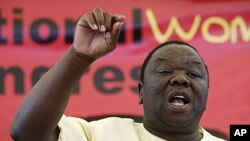Zimbabwe's Movement for Democratic Change (MDC) has elected a new team to take the party into the next elections. Thousands of exuberant delegates voted for a new executive and made resolutions to underpin MDC policy should it become the next government of Zimbabwe.
The MDC says that before it holds its next congress in five years, it will be Zimbabwe’s ruling party. MDC Secretary General Tendai Biti, who is also Zimbabwe's finance minister, said the newly-elected leadership has to lay the groundwork for the party’s role as the next government.
"This is the last congress we are going to have as a party that is not in government on its own. So we need to give a vision on the rule of law and governance issues, constitution and constitutionalism, on the economy. What are the drivers of the economy, what is the size of the economy we see in the next five years and the next 20 years and so forth," Biti said.
The MDC is in a difficult coalition with President Robert Mugabe’s ZANU-PF party, which ruled Zimbabwe from 1980 until 2009, when an inclusive government was negotiated after both ZANU-PF and Mr. Mugabe lost elections to the MDC.
Congress delegates voted for the MDC’s new executive via a secret ballot in an election run by civil rights groups. All provinces unanimously agreed they wanted to retain Morgan Tsvangirai, who is prime minister in the inclusive government, as party president for the next five years,
They also decided to retain Roy Bennett, the party's treasurer-general, who fled into exile last year after repeated attempts to jail him.
Happy at the outcome of the congress was Felix Zifunzi, an MDC executive from an area in Zimbabwe’s midlands where many party members are constantly harassed because of their membership in the 11-year-old MDC.
"I think this is the most organized congress since 2000, people were voted in and voted out without violence. Those who were defeated accepted defeat. Even the president of the party condemned violence, said no to corruption, said no to vote buying, no to use of money, because this party this is the party of the poor," Zifunzi said.
Another MDC delegate from central Zimbabwe, who lives and works on a mine, said MDC members in his area are subjected to intimidation.
"They will tell our direct bosses that if you entertain this character we will take over this company, we will do A,B,C,D - they are saying that as long as you employ an MDC activist we will take over, it’s on a farm, it’s on a mine, it’s anything," said Thomson Richard.
He said he was one of the few who worked on a mine for a ZANU-PF boss, who was also a legislator, and who treated him fairly.
Givoemore Chinophumbuka, a provincial leader from a ZANU-PF stronghold in Zimbabwe’s northeast, said organizing for the MDC is hazardous.
"Anyone who is associated with MDC is threatened with eviction from the areas, from their homes, and some are actually kidnapped, beaten up, there is actually no control at all, so even if our people go to the police, police do nothing," Chinophumbuka said.
He said violence continued even after the 2008 elections because perpetrators had a sense of impunity.
"The perpetrators of violence they are the same people who killed in 2008, and they tell our guys, we are still free, we are above the law?," Chinophumbuka said.
But Chinophumbuka says violence has eased since March, when the regional backer of the inclusive government, the Southern African Development Community, held a meeting in Livingstone, Zambia, to discuss the lack of progress in Zimbabwe. The SADC Troika on Politics, Defense and Security criticized ZANU-PF for the ongoing political violence.
"Because the atmosphere during these few months after this Livingstone meeting is a bit changed. Because there is a realization among ZANU-PF people, that there are lies in what they are being told and so they will not have the punch they used to have. As long as no instructions has come from the top leadership to start again committing atrocities, they will not do that, they will wait for the instruction," Chinophumbuka said.
Biti agreed that the SADC Livingstone meeting was a breakthrough and said he hoped pressure on ZANU-PF would continue so the coalition government could implement all major reforms necessary for free and fair elections, perhaps next year.
"Livingstone was defining, I hope that it wasn’t a flash in the pan, more important was the substance of the meeting - we are drawing the line, we will not tolerate the shenanigans under ZANU-PF all the games played by ZANU-PF. It was very refreshing. It is what happens after Livingstone which is critical, but my own feeling is that I saw a new SADC," Biti said.
SADC is holding an extraordinary summit in Namibia on May 20 to discuss the failure of Zimbabwe’s inclusive government to implement reforms ahead of fresh elections.
The resolutions passed at the MDC congress committed the party to broad democratic principles should it win the next elections and become the next government of Zimbabwe.
Zimbabwe's MDC: Ready to Govern Alone




